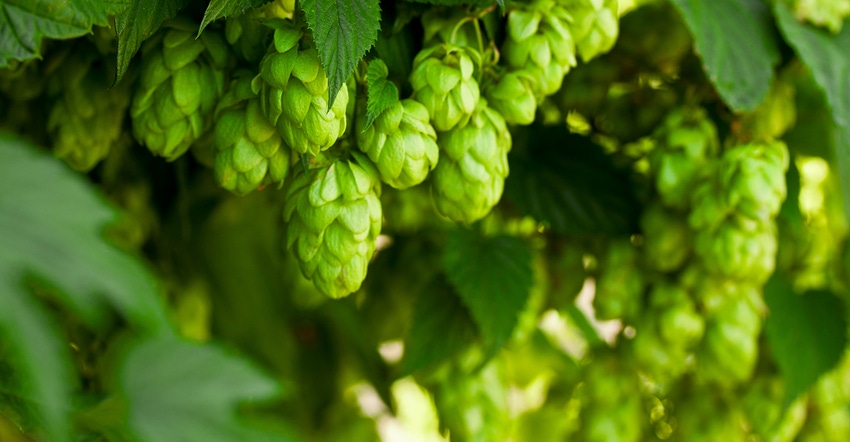November 6, 2017

There’s no question that the craft beer market has changed the nature of the brewing industry. A business that at one time was made up of about 70 major brewers is now populated with more than 6,000 players. But all have one thing in common — they need hops. And at the same time, there’s a challenge with breeding programs for this unique crop.
To counter that, the Brewers Association, a not-for-profit trade association, recently announced an agreement with USDA’s Agricultural Research Service to fund a public hops breeding program. The Brewers Association represents small and independent American brewers producing 6 million barrels per year or less. The largest member is Boston Brewing, but the group represents hundreds of members.
There’s been a decline in research funding that has been going on for “four or five decades,” says Chuck Skypeck, Brewers Association technical brewing projects manager. “The landscape has changed for brewers and hop growers both.”
He explained that when there were just 70 brewers, five of them used 90% of the hops produced. Today, with thousands of brewers, there are many more hops customers. He acknowledged that large brewers support breeding programs, but the public funding of those programs has changed.
As Skypeck notes, hops have only one viable commercial use — brewing beer. And technically, a beverage cannot be called beer without hops, so all beer uses hops.
He explained there’s a need for a public breeding program that focuses not only on new varieties of hops, but also on improving the agronomic traits of hops in the public domain. In a media statement announcing the new funding for a public breeding program, Chris Swersey, supply chain specialist for the association, explains that the program will create benefits for a broad range of groups. “Research to develop and release hop cultivars with no intellectual property protection ensures that all growers have access to high quality, disease-resistant cultivars they need to sustain production at levels required by brewers,” he says.
Expanding acres
With the craft beer boom, there’s been expanding interest to increase hop production in new areas. The casual driver in Wisconsin or Michigan might see more hop trellises in the future, expanding on the acres of hops already in Oregon, Idaho and other areas of the country. “We want to have the agronomic traits for hops that can perform in different environments, ” Skypeck says. “With the expansion of growing regions for hops, these hop growers will be able to trial new varieties coming from this program. And they’ll know work has been done on disease resistance.”
Hops are susceptible to different diseases, including downy mildew — which can be a problem in wetter areas of the country, like the Upper Midwest. These problems are less severe in dry climates out West where hops are grown.
The key to this program is that it will expand varieties and offer improved agronomic traits for the new varieties that will help the grower, and eventually the brewer. “We look at this as a win for the supply of hops,” Skypeck adds.
The new program, structured through USDA, allows development of germplasm that serves all growing regions. The research will prioritize breeding efforts in four areas — sensory requirements as determined by the Brewers Association through a collaborative brewer and industry stakeholder program; improved downy mildew resistance; improved powdery mildew resistance; and improved agronomic performance compared to existing cultivars.
With the agreement signed, USDA is moving forward to hire a professional breeder, and an operating partner facility will be determined. Skypeck notes that this process is close to being locked down, but no further information was available. You can learn more about the association at brewersassociation.org.
About the Author(s)
You May Also Like






